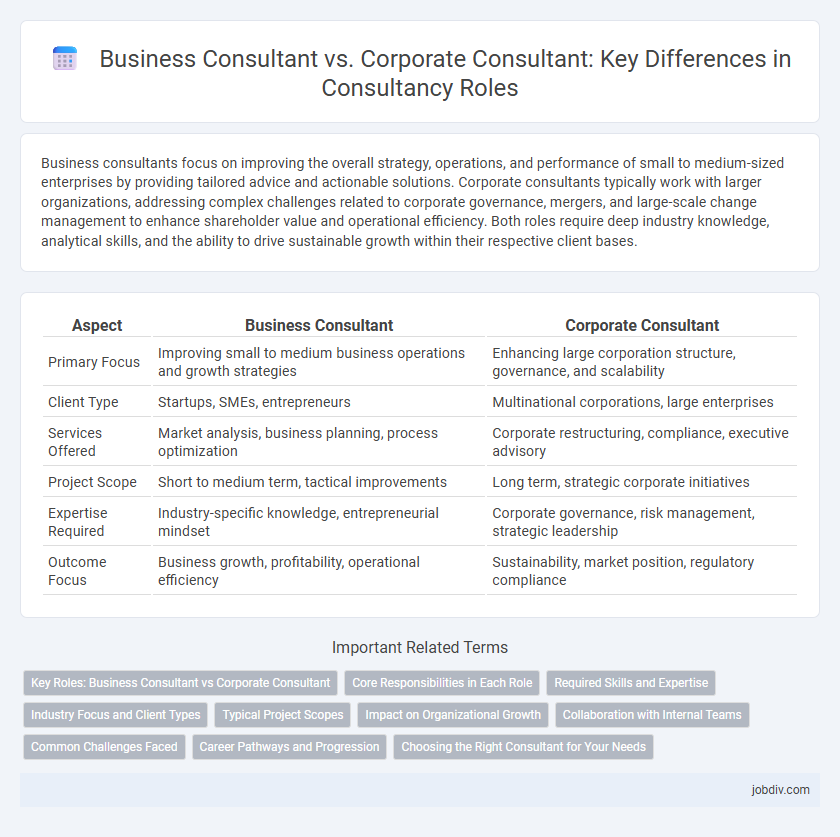Business consultants focus on improving the overall strategy, operations, and performance of small to medium-sized enterprises by providing tailored advice and actionable solutions. Corporate consultants typically work with larger organizations, addressing complex challenges related to corporate governance, mergers, and large-scale change management to enhance shareholder value and operational efficiency. Both roles require deep industry knowledge, analytical skills, and the ability to drive sustainable growth within their respective client bases.
Table of Comparison
| Aspect | Business Consultant | Corporate Consultant |
|---|---|---|
| Primary Focus | Improving small to medium business operations and growth strategies | Enhancing large corporation structure, governance, and scalability |
| Client Type | Startups, SMEs, entrepreneurs | Multinational corporations, large enterprises |
| Services Offered | Market analysis, business planning, process optimization | Corporate restructuring, compliance, executive advisory |
| Project Scope | Short to medium term, tactical improvements | Long term, strategic corporate initiatives |
| Expertise Required | Industry-specific knowledge, entrepreneurial mindset | Corporate governance, risk management, strategic leadership |
| Outcome Focus | Business growth, profitability, operational efficiency | Sustainability, market position, regulatory compliance |
Key Roles: Business Consultant vs Corporate Consultant
Business consultants specialize in analyzing market trends, identifying operational inefficiencies, and developing strategic plans to enhance small to medium-sized enterprises' growth and profitability. Corporate consultants concentrate on large-scale organizational challenges, including corporate governance, risk management, and stakeholder alignment within multinational corporations. Both roles require expertise in data analysis and change management but differ significantly in scale and organizational complexity.
Core Responsibilities in Each Role
Business consultants analyze market trends and develop strategies to improve overall company performance, focusing on growth, operational efficiency, and financial health. Corporate consultants specialize in advising executive leadership on organizational structure, compliance, risk management, and corporate governance to ensure sustainable business practices. Both roles require expertise in problem-solving and strategic planning, yet business consultants target broad market-driven outcomes while corporate consultants emphasize internal policies and executive decision-making.
Required Skills and Expertise
Business consultants require strong analytical skills, financial acumen, and expertise in market research to identify growth opportunities and optimize operational processes. Corporate consultants need in-depth knowledge of organizational development, change management, and regulatory compliance to improve corporate governance and internal performance. Both roles demand excellent communication skills and the ability to tailor strategies to specific industry challenges.
Industry Focus and Client Types
Business consultants primarily serve small to medium-sized enterprises across various industries, providing tailored strategies for growth, operational efficiency, and market expansion. Corporate consultants focus on large corporations, offering specialized expertise in complex organizational structures, regulatory compliance, and high-stakes project management within specific sectors such as finance, manufacturing, or technology. Understanding the distinct industry focus and client types helps businesses select consultants aligned with their scale and sector-specific challenges.
Typical Project Scopes
Business consultants typically focus on improving small to medium-sized enterprises through strategic planning, market analysis, and operational efficiency projects. Corporate consultants handle larger-scale initiatives such as organizational restructuring, compliance management, and digital transformation for multinational corporations. Project scopes for business consultants often involve growth strategies and process optimization, whereas corporate consultants engage in complex risk management and large-scale change management programs.
Impact on Organizational Growth
Business consultants drive organizational growth by identifying market opportunities, optimizing operational processes, and enhancing overall business strategy. Corporate consultants focus on aligning company structures, governance, and culture to improve scalability and long-term sustainability. Both roles contribute to growth but business consultants emphasize external market impact while corporate consultants concentrate on internal organizational development.
Collaboration with Internal Teams
Business consultants typically engage closely with internal teams to analyze operational challenges and implement tailored strategies that enhance overall performance. Corporate consultants often focus on aligning these internal collaborations with broader organizational goals, fostering synergy between departments and executive leadership. Effective collaboration between consultants and internal teams drives innovation and sustains competitive advantage within the corporate structure.
Common Challenges Faced
Business consultants often face challenges such as aligning diverse stakeholder interests and driving organizational change in small to medium enterprises. Corporate consultants typically encounter complexities related to navigating large-scale bureaucracy, ensuring compliance across multiple departments, and managing intricate corporate governance. Both roles require adept problem-solving skills to overcome resistance to change while delivering measurable value to clients.
Career Pathways and Progression
Business consultants typically start in roles analyzing small to medium enterprises and progress by honing skills in strategic planning, market analysis, and operational improvement. Corporate consultants often begin within large organizations or specialized firms, advancing through expertise in change management, corporate governance, and stakeholder engagement. Career pathways for business consultants emphasize versatility across industries, whereas corporate consultants focus on deepening sector-specific knowledge and executive-level advisory roles.
Choosing the Right Consultant for Your Needs
Business consultants specialize in improving overall company performance by analyzing market trends and operational efficiency, while corporate consultants focus on strategic planning and organizational restructuring at a higher executive level. Selecting the right consultant depends on your specific objectives, whether optimizing day-to-day operations or driving large-scale corporate transformations. An informed decision requires assessing the scope of your project, desired outcomes, and consultant expertise in your industry sector.
Business Consultant vs Corporate Consultant Infographic

 jobdiv.com
jobdiv.com